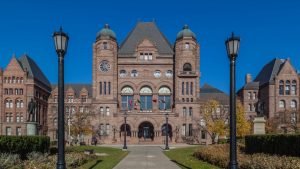Representatives from Ontario’s feuding compulsory and noncompulsory trades have resolved major differences over scopes of practice and compliance and enforcement policy being created under new Ontario College of Trades (OCOT) legislation after four days of meetings arranged by Minister of Labour Kevin Flynn.
Legislation passed by the Ontario legislature last December implementing reform to the four-year-old college following the release of the Dean Report in November 2015 called for the creation of a compliance and enforcement committee to consult with stakeholders and recommend a new compliance and enforcement policy to the minister within six months. Bill 70 requires the policy to be posted on the OCOT website on June 6.
Before and after Bill 70 was approved, the building trades had aligned on opposite sides over the reforms. Noncompulsory trades represented by such groups as the Labourers’ International Union of North America (LIUNA) and the Carpenters’ District Council of Ontario spoke in favour of the new compliance and enforcement process as well as other reforms including the introduction of a new penalties and appeals process and also a new classification roster to hear requests for reclassification of trades.
However, unions representing compulsory trades such as the International Brotherhood of Electrical Workers (IBEW), the Ontario Pipe Trades Council (OPTC) and the Ontario Sheet Metal Workers’ and Roofers’ Conference argued the reforms could lead to unskilled workers undertaking dangerous work, putting the public at risk. The Progressive Certified Trades Coalition (PCTC), composed of compulsory trades groups, had launched a campaign of protests before Bill 70 was passed and continued to picket MPPs’ offices into 2017.
Now, there appears to be harmony between the two groups.
"The noncompulsories came to the table open-minded, and so were the compulsories, and they came together as the building trades and got it resolved," said James Hogarth, business manager of the OPTC and a leader of the PCTC.
Mike Gallagher
International Union of Operating Engineers Local 793
"We are surprised and pleased that a consensus could be reached," commented Mike Gallagher, business manager of Local 793 of the International Union of Operating Engineers, whose union contains both voluntary and compulsory trades as designated by OCOT and who had previously spoken in support of the Bill 70 reforms.
"Hats off to all the building trades that participated."
A statement posted on the IBEW website April 11 outlined the process undertaken during the four days of meetings at the end of March and early April, with further details revealed by other sources. Flynn asked George Adams, a former Justice of the Ontario Superior Court and formerly chair of the Ontario Labour Relations Board (OLRB), to serve as facilitator of the discussions, and the minister kicked off the first session with comments.
Said Gallagher of Flynn, "He quite genuinely presented the fact that he felt it was very important for the trades to find a way through the issues for the College of Trades to be able to function properly."
Hogarth said about 12 trades were represented.
The IBEW post outlines a Memorandum of Advice that was reached. IBEW Construction Council of Ontario executive chairman James Barry, a member of the OCOT board, said the signatories to the memorandum have not yet approved its release to the public.
The post indicates all building trade unions endorsed the following principles:
a vigorous approach to enforcement of those provisions of the Ontario College of Trades and Apprenticeship Act (OCOTAA) that prohibit the practice of a compulsory trade by anyone not holding a certificate of qualification in that trade;
proper enforcement of the journeyperson-to-apprentice ratios established under the OCOTAA;
future discussions between certain trade unions aimed at producing bilateral written agreements on obviously appropriate work allocations between certain trades; and
a definition of risk of harm that is sensitive to scopes of practice, trade agreements, well-established trade practices and OLRB decisions.
"Unless you have the full document, you can’t parse individual pieces and cherry-pick pieces because doing that does a real disservice to the agreement," commented Jason Ottey, government relations officer with LIUNA Local 183.
Enforcement policy was a key part of the consensus, he said, adding the agreement offers a pathway to inspectors.
"It was really coming up with an approach that an inspector could apply and a structure that would be there that would facilitate the right types of decisions that would be made by an OCOT inspector."
Gallagher praised the establishment of a process that will enable trades to work together to resolve future problems. He said all trades support competent workers on jobsites, ensuring the public interest is respected.
"We might disagree on overlapping work jurisdictions, stuff like that, but all of these trades are very concerned that jobsites be safe," he said. "And the work that’s been done over 60 years in developing standards should not be watered down."
Commenting on the fact that the Ministry of Labour paid for Adams to serve as facilitator, Progressive Contractors Association of Canada senior manager of public affairs Karen Renkema criticized the process as an abuse of taxpayer dollars.
Renkema said in an emailed statement, "They are relying on the public dime to solve their internal strife and promote a solution that favours only their sector without taking into consideration all other industry players (including construction employers) that are affected by the college’s enforcement policy."
A spokesperson for the Ministry of Labour commented in an email that the minister is reviewing the advice from the trades.
Hogarth said, "It is an industry resolve, from both sides, compulsory and noncompulsory. It was the advice of the industry. I think they will be hard pressed not to accept it."










Recent Comments
comments for this post are closed